Black mouth curs are tan-colored dogs with black muzzles. They often have dark markings around their eyes and ears and sometimes have white chests.
These dogs can weigh as little as 35 pounds or as much as 100 pounds. As working dogs, it’s essential that they get plenty of exercise. Training can be a challenge since they can be stubborn, but they’re also intelligent and learn relatively quickly.
This article discusses black mouth cur growth and development, including when to expect your puppy to hit certain milestones and how to train them.
Black Mouth Cur Summary
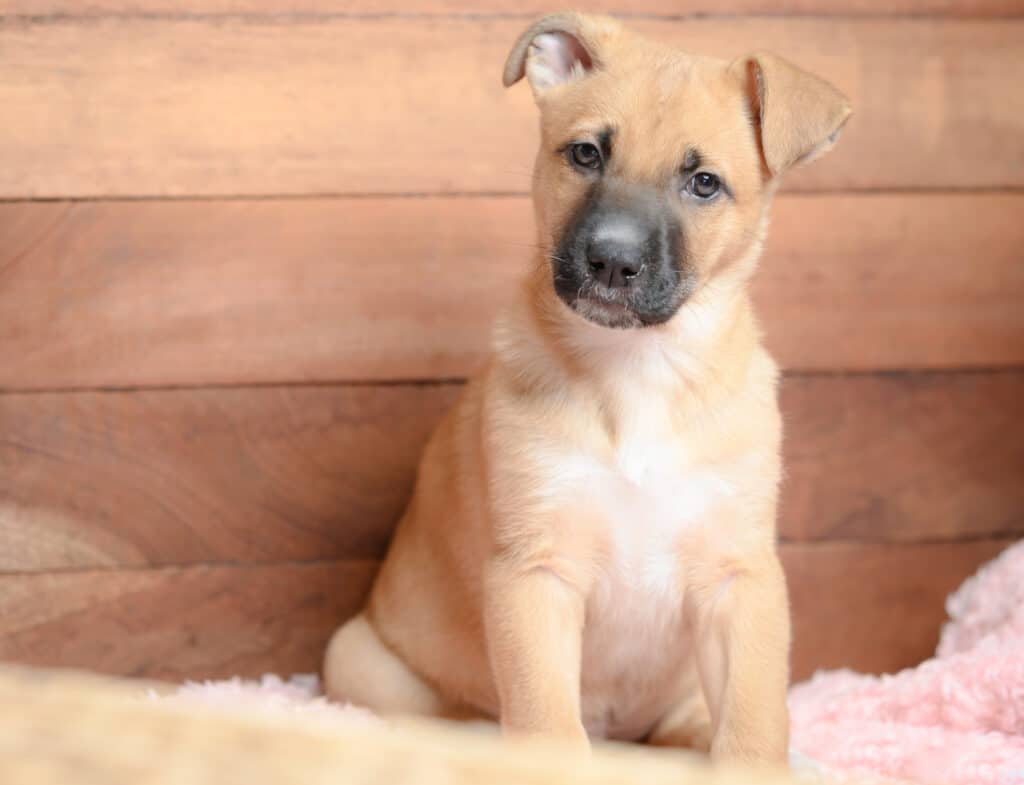
The breed’s name comes from their distinctive black muzzles.
©Jennifer Kramer/Shutterstock.com
The black mouth cur is a mid to large-sized working dog bred to hunt, herd, and guard. The breed originated in the southern United States.
They are rare dogs, not yet recognized by the American Kennel Club (AKC). The United Kennel Club (UKC) first recognized the breed in 1998.
Black Mouth Cur Growth and Weight
These dogs range widely in adult size, from 35-100 pounds (though the UKC breed standard has only minimum weight limits, with no maximum size listed). Puppy weights will also range widely.
Check in with your veterinarian regarding your puppy’s weight if you have any concerns. It’s important that they’re gaining weight steadily as they grow, and not losing weight or stagnating.
Puppies grow most rapidly during the first few months of age and will reach their full size by around 12-18 months.
When Will My Black Mouth Cur Stop Growing?
Your black mouth cur should reach its full adult size at 12-18 months old. They’ll reach their full height sooner but will continue to gain weight and muscle mass.
Always consult with your veterinarian if you’re unsure whether your dog weighs enough for their age. They can also offer advice on feeding.
Every black mouth cur should start with large breed puppy food, then be transitioned to adult dog food as they age.
Following food label recommendations for your dog often leads to overfeeding, as these labels are usually inaccurate. Never restrict your dog’s water intake unless told otherwise by a veterinarian for health purposes.
How Big Will My Black Mouth Cur Be When It’s Fully Grown?
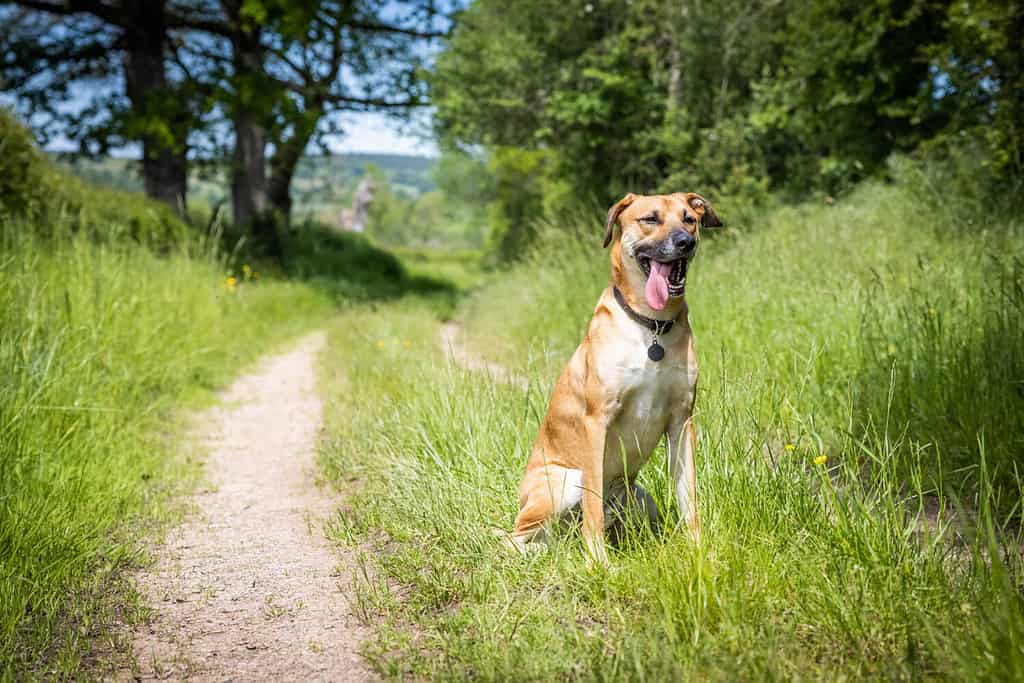
Black mouth curs weigh a minimum of 35 pounds with no upper weight limit.
©Oakland Images/Shutterstock.com
The UKC breed standards state that adult black mouth curs should stand a minimum of 18 inches tall at the shoulder. Females should weigh at least 35 pounds, and males at least 40 pounds.
However, these dogs can get much bigger than you might assume given these numbers and some males reach 100 pounds! It depends on the bloodline and genetics.
The best way to estimate how large your puppy will be as an adult is to ask your breeder how large their relatives are. However, you’ll never have exact figures until your dog is fully grown.
When Should My Black Mouth Cur Be Spayed or Neutered?
Veterinarians typically recommend waiting to spay or neuter your dog until they’re fully grown, which for black mouth curs happens between one to two years of age.
Dogs spayed or neutered too early have a higher chance of developing joint problems throughout their lives, and this is especially true for large dogs like black mouth curs.
However, spaying or neutering too late also comes with its risks, including behavioral problems and reproductive cancers. During your puppy check-ups, ask your vet when they recommend the procedure and follow their guidelines.
When Should My Black Mouth Cur Be House Broken?
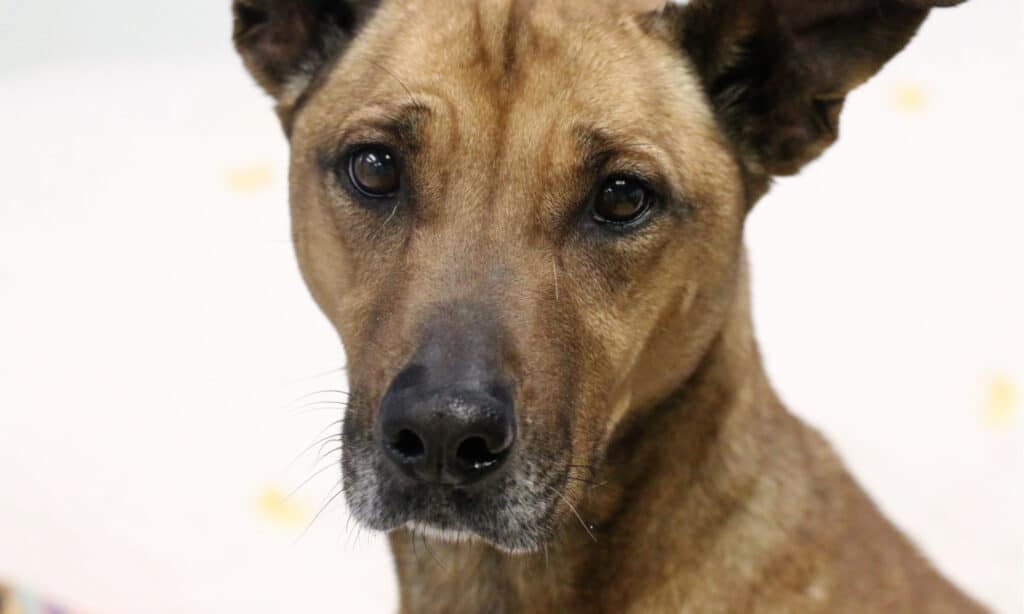
Black mouth curs catch onto potty training well when positive reinforcement is used.
©Kelley Varisco/Shutterstock.com
Potty training for your black mouth cur can begin at 12-16 weeks of age. It’s always important to keep realistic expectations for our dogs, so you should know going in that puppies cannot hold their bladders for very long.
In the beginning, you’ll need to take them outside every two to three hours. This doesn’t stop at night, when they’ll still need potty breaks to relieve themselves.
Puppies can hold their bladders an average of one hour per month of age, starting at twelve weeks old and ending at six months, when they can comfortably hold it for around six to eight hours.
Never push your black mouth cur to hold their bladder as long as possible for their age or longer, even if they can do so. This will usually lead to potty accidents while they’re young and can potentially cause health problems. Just like it’s not healthy for us to hold it in when we have to pee, it’s also not healthy for our dogs!
How to Potty Train
Potty training your black mouth cur is a simple but tedious and time-consuming process. It requires constant supervision and many trips outside throughout the day.
In addition to taking them out every couple of hours throughout the day and night, you should also give your puppy potty breaks:
- As soon as you wake up in the morning
- After a meal or a large drink of water
- After playing
- Right before bedtime
Let your puppy sniff, but don’t distract them too much until they’ve gone potty. You’ll need to remain outside each time until they pee, poop, or both.
When your puppy does pee or poop outside, reward them with treats and celebrations! You want them to feel good about themselves so that they continue wanting to potty outdoors.
Don’t leave your puppy unattended in hard-to-clean areas, such as carpeted rooms or behind furniture. Leashes, playpens, and exercise pens can all keep your puppy contained and close to you so they aren’t wandering off to find a spot to pee or poop.
You’ll also want to watch your puppy closely for signs that they have to go, such as sniffing, pacing, or squatting. Catch them before they potty and bring them outside immediately.
Crates can be an effective tool for potty training, but please remember that they aren’t an alternative to frequent potty breaks. When crate training your pup, never use the “cry it out” method or use the crate as punishment.
Handling Potty Accidents
Inevitably, your puppy will have an accident indoors. You should never scold your dog, push their face into the mess, or punish them in any other way. It’s also not okay or healthy for your pup to limit their water consumption at any time.
Remember that your black mouth cur is still a baby, and they don’t know better. Indoor accidents are always the fault of the humans, whether we miss the signs our pup has to pee or expect them to hold it a little too long.
Instead of punishing your dog, clean the mess thoroughly using a pet enzyme cleaner to prevent future accidents in that spot. Remain calm and behave as normal toward your puppy.
If your puppy is having many accidents, you likely need to revise your potty training schedule to take them outside more frequently. You may also need to stay outside until they potty, even if it takes time.
When Should My Black Mouth Cur Stop Eating Puppy Food?
Your black mouth cur puppy should eat a vet-recommended puppy food formulated for large dogs, such as Purina Pro Plan or Hill’s Science Diet. This helps support their growth and development.
Follow the instructions on the food label or consult your veterinarian about when to switch your dog to adult dog food. Most brands recommend making the switch when your dog is between one to two years old, depending on their weight.
Some dogs do okay with switching foods overnight, but it’s recommended to make the switch slowly. When you have a week or two of puppy food left, purchase your dog’s adult food.
Begin by mixing 10% of the new food and 90% of the puppy food. Increase the amount of new food day by day to 25%, then 50%, then 75%, and finally to 100%.
If your black mouth cur won’t eat their food or has an upset stomach, revert to the previous amount of new food for a few days before increasing it again.
Sticking to the same brand and protein (meat) is typically recommended when switching from puppy to adult food. However, if you’ve been wanting to switch brands, this can be a good time to do so.
Talk to your veterinarian if your puppy struggles too much with switching foods, especially if their stomach problems persist for more than a couple of days.
When Will My Black Mouth Cur Start Losing Teeth?

Teething for a black mouth cur doesn’t end until they’re around seven months old.
©Anna Hoychuk/Shutterstock.com
Your black mouth cur will begin losing their puppy teeth at around 12-16 weeks old. You may or may not find teeth around your home at this time.
You’ll definitely notice an increase in chewing, and your puppy may act out because of the pain. Provide a variety of chew toys in different shapes and textures, and try to always keep one on hand to distract your puppy if they begin gnawing on your fingers or clothes.
Your house should also be thoroughly puppy-proofed. Don’t leave any wires, toxic substances (including plants, cleaners, and foods), or valuables within your puppy’s reach.
Your black mouth cur won’t have all of their adult teeth until around six to seven months old, so the teething phase may last some time.
When Should I Start Training My Black Mouth Cur?
Ideally, training begins while your puppy is still with their breeder. Reputable black mouth cur breeders work on socialization and training from a very young age.
When you bring your puppy home, it’s good to give them at least a few days to decompress. But, you can still work on getting them used to handling and house rules.
After this short period, you should begin to work on socialization, basic cues, manners, and safety cues.
Always use positive reinforcement or force-free training techniques, and avoid aversive tools or methods. Your dog doesn’t need you to be the “alpha” or dominate them – this kind of training is actually incredibly detrimental.
What Cues Should I Teach My Black Mouth Cur First?
There are several types of cues you can focus on when training your black mouth cur puppy. We’ll talk about the ones to begin with below, broken down by category.
It’s vital to remember to only use force-free training methods and avoid aversive techniques and tools. Stubborn and intelligent breeds like black mouth curs thrive when training sessions are a positive, fun experience.
Basic Cues
Basic cues are things like sit, down (lay down), and stay. They’re foundational cues that every dog should know, and that can be built upon for more complex tricks later in life should you choose to do so.
Start with sit and down, and progress to stay as your puppy understands the other commands. Remember that puppies have short attention spans, so staying in one place is going to be very difficult for them. Keep your expectations realistic and reward obedience heavily!
Safety Cues
Safety cues are essential for every dog to know in order to stay safe. A great place to begin is with “leave it” and “drop it” to prevent your puppy from eating things they shouldn’t. “Leave it” tells them not to touch something, and “drop it” tells them to put down what’s already in their mouth.
You’ll also want to start working on recall or coming when called. Work on this skill inside the house or yard, but don’t take your puppy out without a leash yet. It’s important to remember that many puppies are naturally clingy, and their off-leash skills may regress around adolescence.
Manners
Manners is a broad category, and it’s not only about cues. It’s about your black mouth cur learning proper behavior in the home, and interacting with people and animals.
You’ll want to work on leash manners, greeting guests without jumping, and bite inhibition. Remember to keep your expectations realistic – your puppy may not have the attention span to heel at your side for long periods, and they need time to explore the world around them as well.
It’s also okay, and encouraged, to implement management techniques such as baby gates to keep them from jumping on guests or children. Puppies are incredibly excitable, and training while they’re riled up can be an unnecessary challenge. It’s also sometimes irresponsible to give them the chance to jump when they could hurt someone!
Socialization
Lastly, socializing your black mouth cur puppy to a variety of situations is important to raising a confident, well-behaved dog. Spend time around people of all races and genders, and let your pup see people who wear hoods or hats, or use mobility tools like walkers or canes. You don’t need to greet everyone – just learning to behave in their presence without lunging or barking is enough.
Introduce your puppy to new environments like the vet’s office, and play scary sounds such as fireworks at a low volume to begin desensitizing them to the noise.
Teach them to accept handling for future grooming sessions or vet trips by touching their ears, mouth, and paws.
Essentially, if you want your adult dog to be okay in any given situation, introduce them to it as a puppy. Just make sure not to overwhelm them by presenting too many new things at once. Remember that they’re new to this world and it can be a big, scary place for a pup!
When Will My Black Mouth Cur Calm Down?
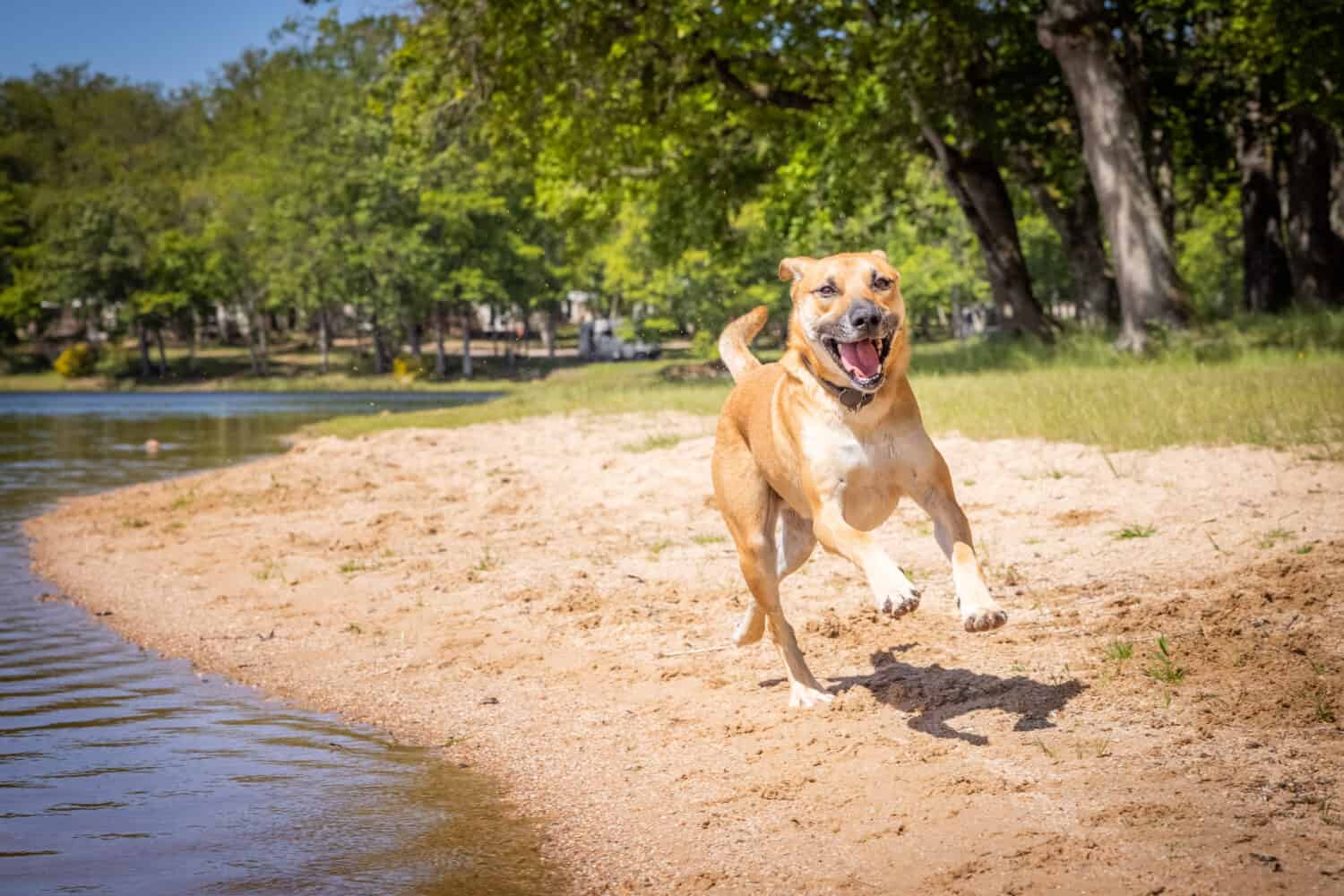
Most black mouth curs have high energy levels even into their senior years.
©Oakland Images/Shutterstock.com
Black mouth curs are big puppies, and that can make them difficult to manage during puppy teething and the rebellious phase of adolescence. As high-energy working dogs, they also want to be on the go constantly!
Puppies tend to have frequent, short bursts of energy, and they need tons of sleep (up to 19 hours a day!). On the other hand, adult dogs have more endurance and sleep less, but they don’t tend to be as hyperactive.
Your black mouth cur will likely behave more calmly once they hit adulthood at 12-18 months. They’ll have longer attention spans and more patience. However, this is also when you’ll need to settle into an exercise routine, which should include at least an hour or two of physical activity.
The more you exercise your black mouth cur, the greater endurance and more energy they’re bound to have. It’s important to balance this with an “off switch,” or the ability to settle.
Mental enrichment is equally as important, as these are intelligent working dogs. They need activities to engage their mind and a “job” to do, even if it’s just picking up their toys after play or fetching the TV remote from across the room.
Common Health Issues Your Black Mouth Cur Might Experience
Black mouth cur breeders tend to focus on the dogs’ ability to work, which is a great thing as it reduces health problems in the breed. As a relatively rare breed, they’re also not as overbred as many other, less healthy breeds.
Some health issues you may see in your black mouth cur include:
- Hip dysplasia: This occurs when the hip doesn’t develop properly, which can cause pain and difficulty walking. Some dogs need surgery to repair the joint. Breeders should perform genetic health testing on both parents to prevent hip dysplasia in their lines. Dog guardians can further protect their black mouth curs by waiting to neuter until the dog is fully grown and by not overexercising their puppies or allowing them to jump.
- Allergies: Allergies can be seasonal or food-related, with environmental allergies being the most common. Symptoms can include itchiness, stomach upset, and secondary ear infections.
- Epilepsy: Epilepsy causes seizures in dogs. Primary, or idiopathic, epilepsy is most commonly seen in black mouth curs who are one to five years old.
- Eye conditions: Black mouth curs are prone to several eye conditions, some of which have genetic health tests. Breeders should have up-to-date health testing for both parent dogs, and shouldn’t breed any dog with genetic health conditions.
Pictures of Black Mouth Curs as Puppies
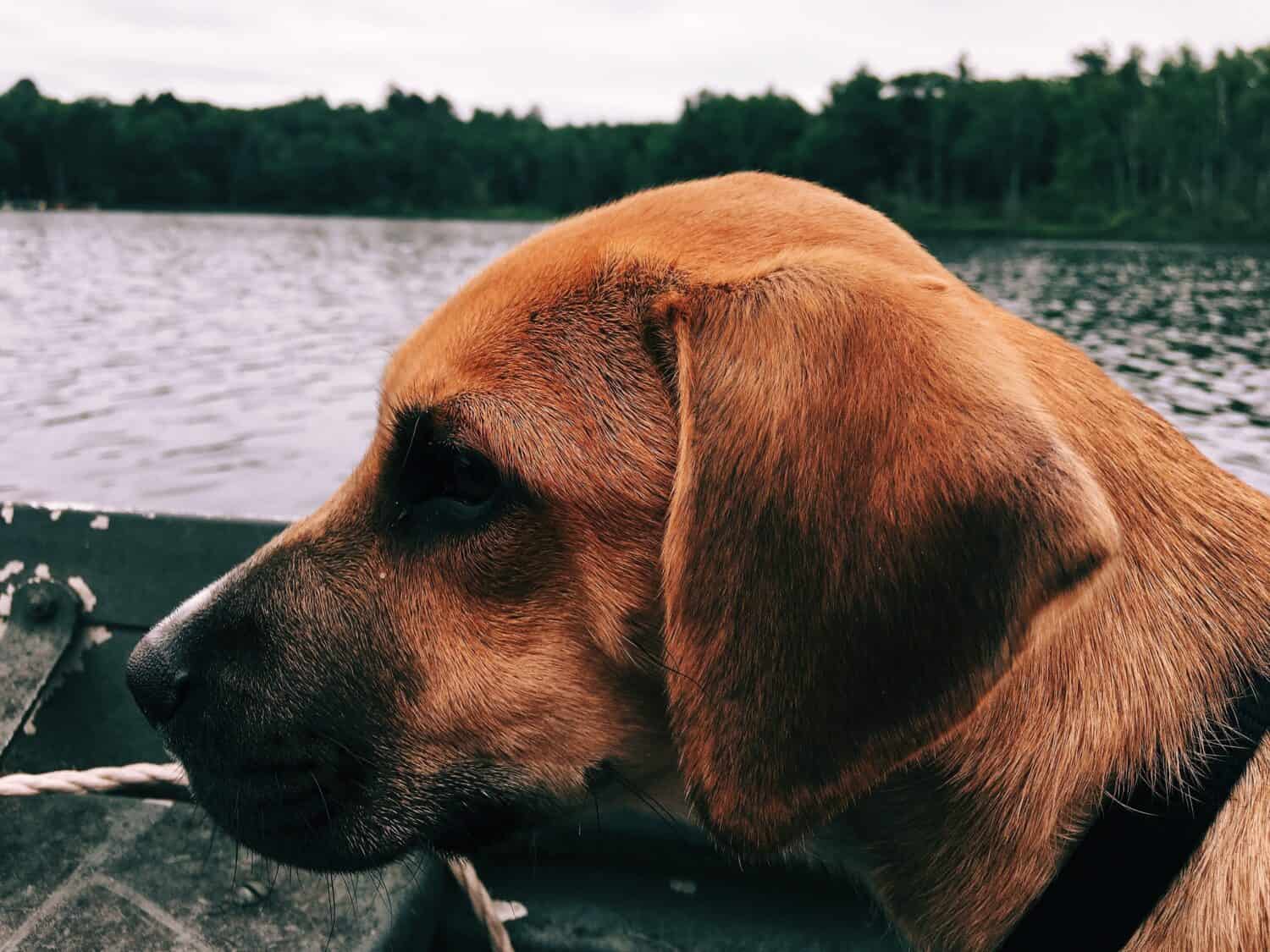
Puppyhood is one of the most expensive times for black mouth cur owners due to puppy vaccines.
©Jeffrey Lee/Shutterstock.com
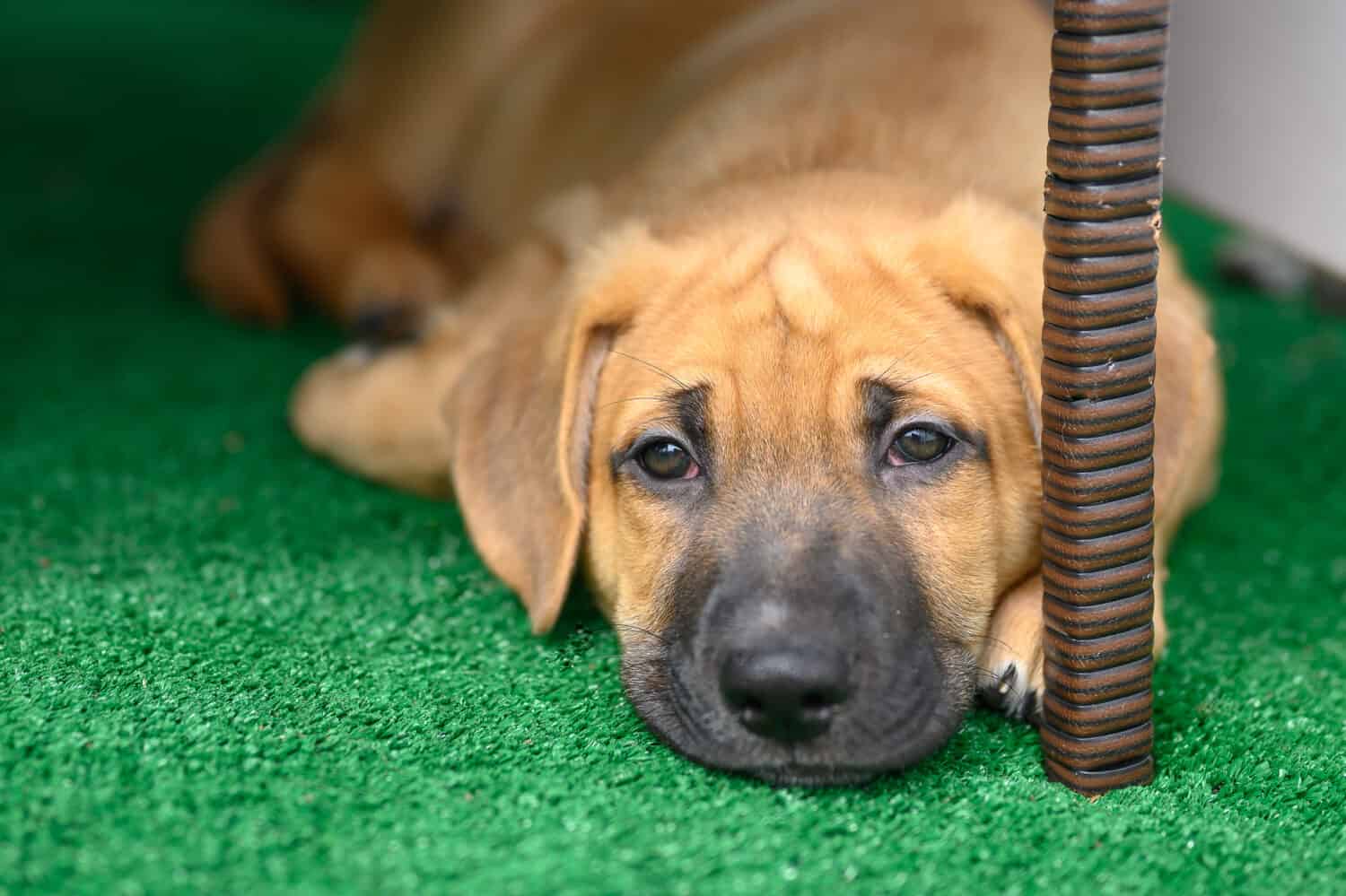
Black mouth cur puppies sleep up to 19 hours daily but are very active when awake.
©Jennifer Kramer/Shutterstock.com
Pictures of Black Mouth Curs at 6 Months
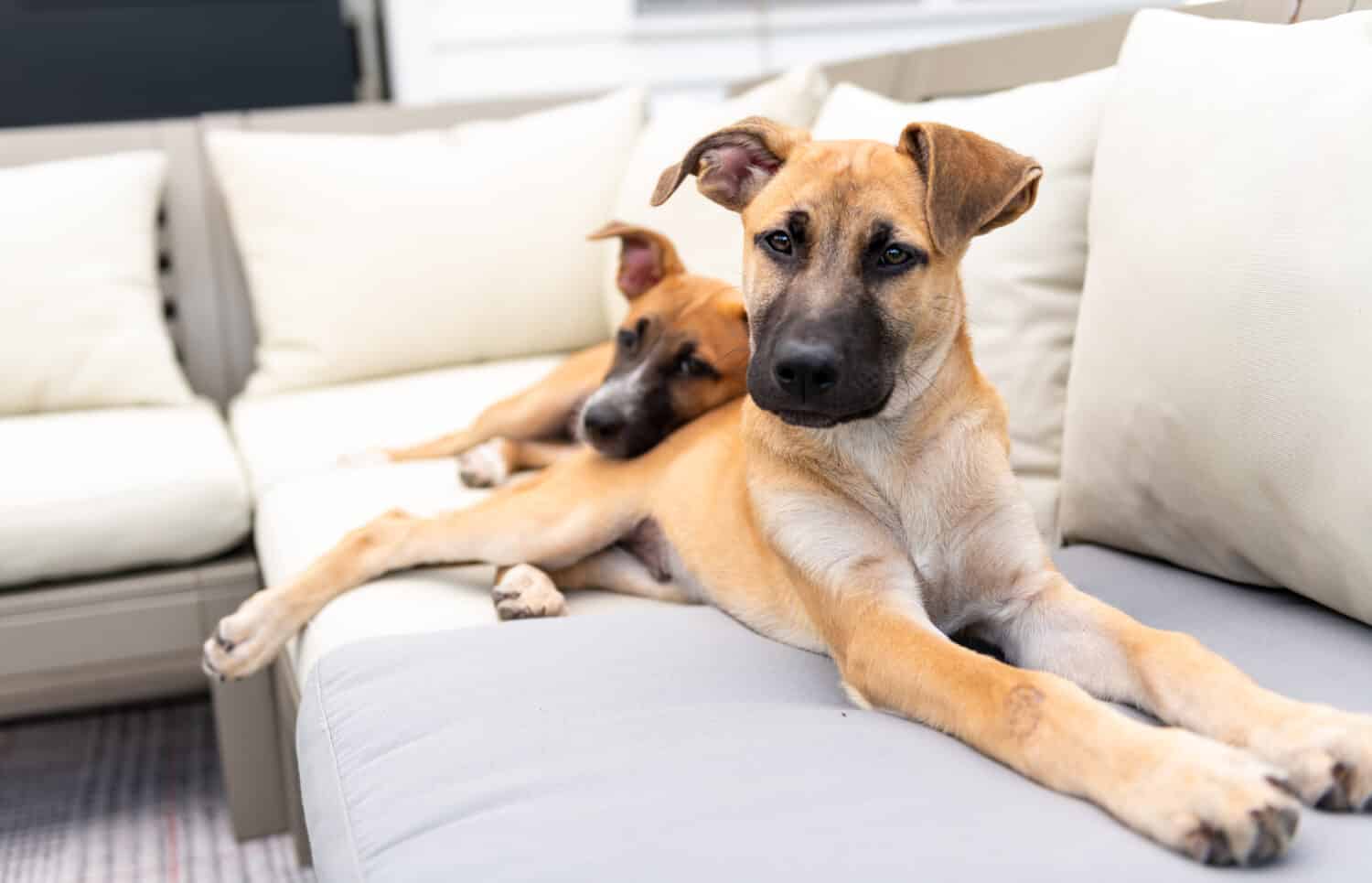
Jumping on and off furniture should be limited for black mouth curs under 18 months old as it can harm their growing joints.
©Anna Hoychuk/Shutterstock.com
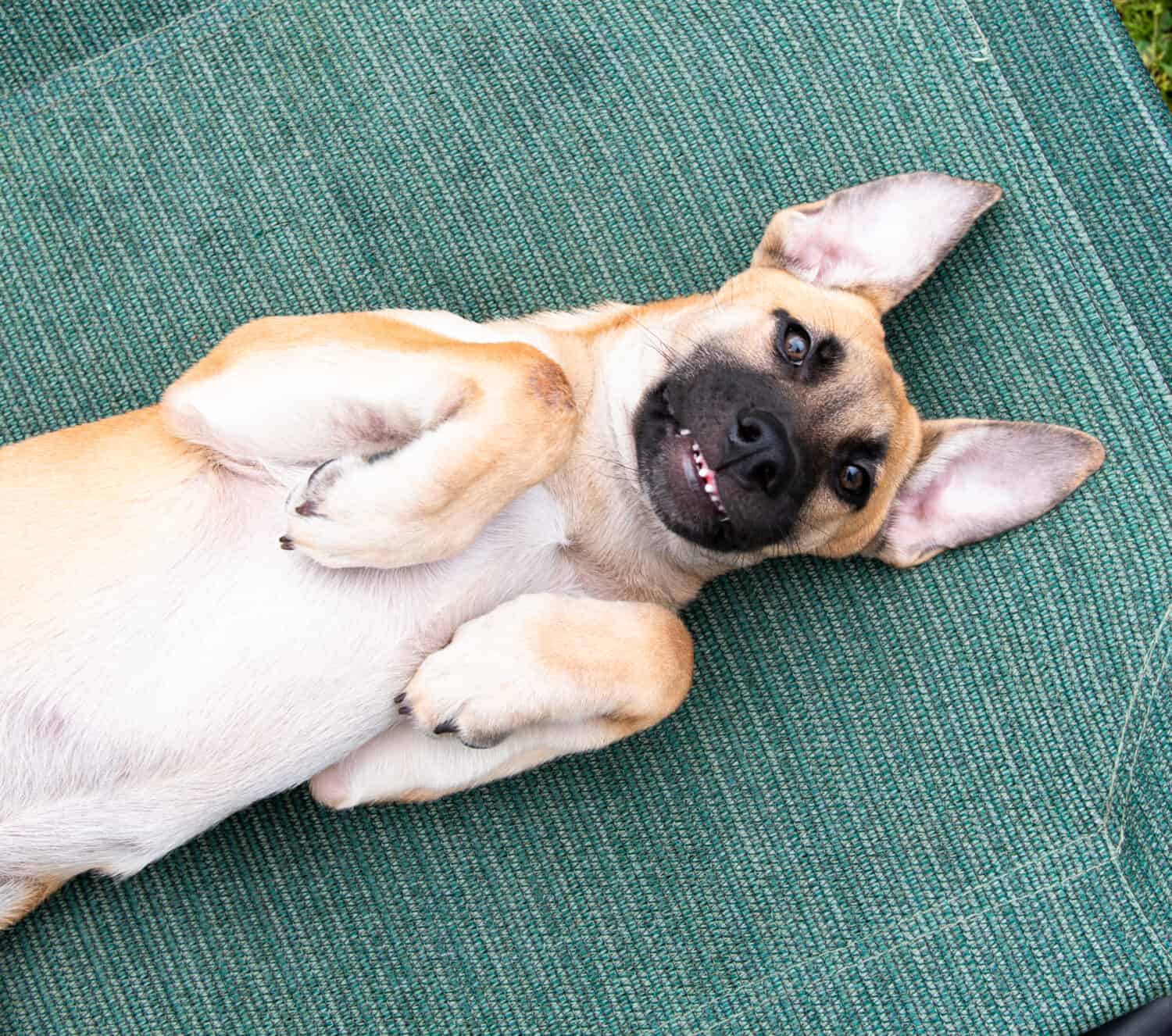
As they age, black mouth curs lose their puppy teeth and some of their hyperactivity.
©Anna Hoychuk/Shutterstock.com
Pictures of Fully Grown Black Mouth Curs
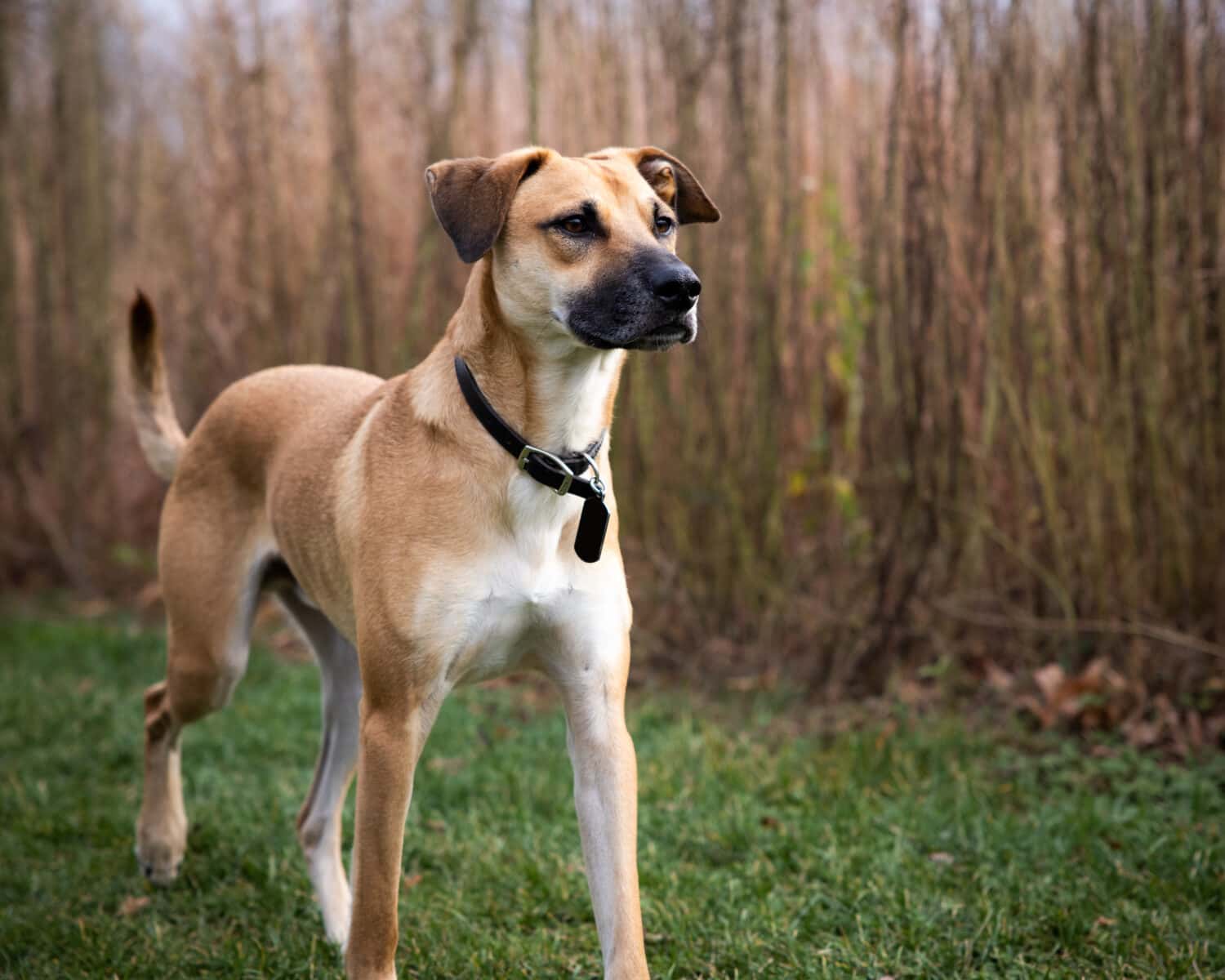
Adult black mouth curs require at least 1-2 hours of daily exercise.
©Wirestock Creators/Shutterstock.com

Brisk walks, hikes, or jogs are great ways to exercise your black mouth cur.
©Wirestock Creators/Shutterstock.com
The photo featured at the top of this post is © Anna Hoychuk/Shutterstock.com
Ready to discover the top 10 cutest dog breeds in the entire world?
How about the fastest dogs, the largest dogs and those that are -- quite frankly -- just the kindest dogs on the planet? Each day, AZ Animals sends out lists just like this to our thousands of email subscribers. And the best part? It's FREE. Join today by entering your email below.
Thank you for reading! Have some feedback for us? Contact the AZ Animals editorial team.







